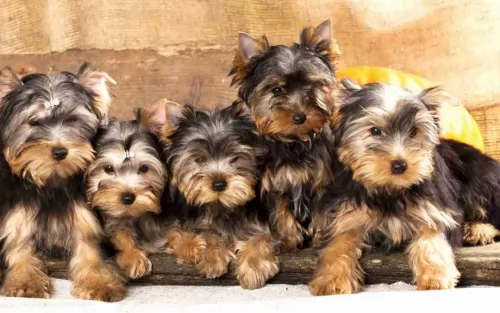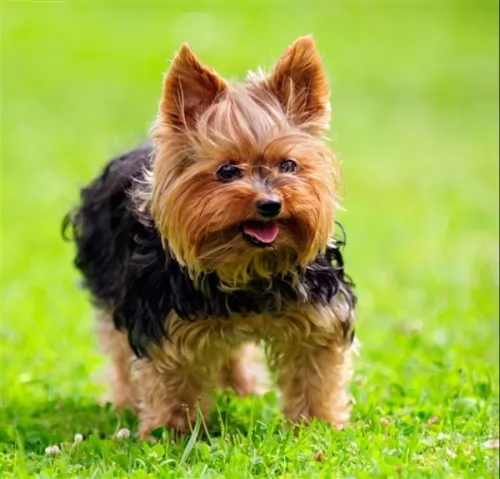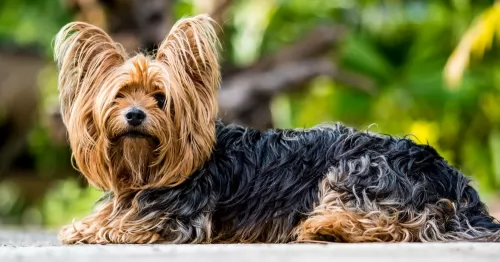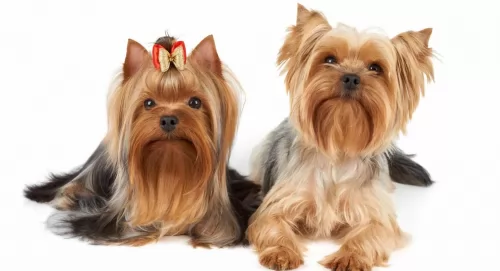 Petzlover
Petzlover Yorkshire Terrier is originated from United Kingdom but German Longhaired Pointer is originated from Germany. Yorkshire Terrier may grow 47 cm / 18 inches shorter than German Longhaired Pointer. Yorkshire Terrier may weigh 29 kg / 63 pounds lesser than German Longhaired Pointer. Both Yorkshire Terrier and German Longhaired Pointer has almost same life span. Both Yorkshire Terrier and German Longhaired Pointer has almost same litter size. Yorkshire Terrier requires High Maintenance. But German Longhaired Pointer requires Moderate Maintenance
Yorkshire Terrier is originated from United Kingdom but German Longhaired Pointer is originated from Germany. Yorkshire Terrier may grow 47 cm / 18 inches shorter than German Longhaired Pointer. Yorkshire Terrier may weigh 29 kg / 63 pounds lesser than German Longhaired Pointer. Both Yorkshire Terrier and German Longhaired Pointer has almost same life span. Both Yorkshire Terrier and German Longhaired Pointer has almost same litter size. Yorkshire Terrier requires High Maintenance. But German Longhaired Pointer requires Moderate Maintenance
 The Yorkshire terrier originated in Yorkshire which is a place in northern England. In mid 19th century workers from Scotland came to Yorkshire in search for work. They brought different varieties of small terriers with them. Earlier they are known as Broken Haired Scotch Terrier and then Toy Terrier. In 1874 they were officially named as Yorkshire Terrier. They begun their journey as hunting dogs and later developed as companion dogs. AKC registered the breed in 1878.
The Yorkshire terrier originated in Yorkshire which is a place in northern England. In mid 19th century workers from Scotland came to Yorkshire in search for work. They brought different varieties of small terriers with them. Earlier they are known as Broken Haired Scotch Terrier and then Toy Terrier. In 1874 they were officially named as Yorkshire Terrier. They begun their journey as hunting dogs and later developed as companion dogs. AKC registered the breed in 1878.
 Looking at the German Longhaired Pointer you may think that you’re looking at a type of Setter dog or even a large Spaniel. These pointing dogs, hailing from Germany, are gun dogs or working dogs, having always been used to track game.
Looking at the German Longhaired Pointer you may think that you’re looking at a type of Setter dog or even a large Spaniel. These pointing dogs, hailing from Germany, are gun dogs or working dogs, having always been used to track game.
They were developed at the end of the 19th century, as breeders were specifically looking for a dog that was faster than the wiry- and short hair German pointers. Crossing English Setters and Pointers gave breeders this German Longhaired Pointer and the dog was shown for the first time in Germany in 1879.
Known as the GLP or Deutsch-Langhaar, the dog has the bloodlines of water dogs and scenthounds, and way back In 1897, Baron von Schorlemer wrote the first standard for the German Longhaired.
 Yorkshire terriers are one of the glamorous member of the dog breeds. They have excellent personality as their owner will be surely proud of them when taking them in public. They like to go outside and make adventures. They are good companion dogs and watch dogs too. They are very affectionate with their owners. Yorkies always bark when any stranger comes and they should be taught about neighbours and when to bark. They will get angry on seeing new dogs and surely chases squirrels.
Yorkshire terriers are one of the glamorous member of the dog breeds. They have excellent personality as their owner will be surely proud of them when taking them in public. They like to go outside and make adventures. They are good companion dogs and watch dogs too. They are very affectionate with their owners. Yorkies always bark when any stranger comes and they should be taught about neighbours and when to bark. They will get angry on seeing new dogs and surely chases squirrels.
They like to spend more time with their people. Leaving them alone for long time is not good. Yorkshire terrier should be treated gently and with love. They love to spend time with older children. They love apartment life if they are made to play and walk daily. Yorkies are the second most popular dog in America.
 Athletic and lean, the German Longhaired Pointer is a medium to large sized dog standing at 60 – 70 cm in height and weighing 25 to 32kg.
Athletic and lean, the German Longhaired Pointer is a medium to large sized dog standing at 60 – 70 cm in height and weighing 25 to 32kg.
With his webbed feet, he can move with great speed. It is why the dog isn’t suited well to life in the city really, as he has always been a dog used to working and running over large areas. He will appreciate being with an active owner.
The beautiful double coat is medium length, slightly wavy and with feathering around the legs, chest and tail. The tail itself is carried stretched outwards or kept low. It is rich brown to coppery color, while some white can sometimes be found on the chest and paws. The attractive dog has brown eyes, a black nose and ears which are long and floppy.
Intelligent, gentle and amicable the German Longhaired Pointer is an affectionate, loyal dog who is also social, getting on well with other pets in the home as well as with children.
Being the loyal dog that he is, it makes him susceptible to separation anxiety so he should never be put into the backyard and left day after day on his own.
 Yorkshire terrier are not so much friendly with children. It is not advised to leave them with children without adult supervision.
Yorkshire terrier are not so much friendly with children. It is not advised to leave them with children without adult supervision.
They were previously used to catch rats and hunt badger and fox. They are excellent watchdogs and defend their territory very well.
They adapts well for apartment living. But they will not be happy if leaved alone for a long time. Yorkies cannot tolerate too hot or cold weather.
They are moderately easy to train. Yorkshire terrier should be trained early when they are amenable to process. Sessions should be conducted with lots of treats and must be short as they will easily get bored.
 German Longhaired Pointers are calm, friendly dogs who want to please their owners. They’re really intelligent too so training and socialization won’t be difficult with this bright dog.
German Longhaired Pointers are calm, friendly dogs who want to please their owners. They’re really intelligent too so training and socialization won’t be difficult with this bright dog.
Once trained, he makes an excellent, loyal and loving family pet. With a firm, kind, consistent type of owner, the German Longhaired Pointer is guaranteed to make you a wonderful pet.
 You’ll find that with an excellent diet and lots of love and care your German Longhaired Pointer can easily push 12 to 14 years of age.
You’ll find that with an excellent diet and lots of love and care your German Longhaired Pointer can easily push 12 to 14 years of age.
If you’re a novice dog owner, talking with your vet will give you a good idea of how to feed your dog to ensure longevity.
No matter how vibrant and energetic your pet is, there may well come a day when he is lethargic, he just wants to lie, he doesn't want to eat and he doesn’t jump up to greet you. Then it’s time for concern and to get your 4-legged friend to the vet.
There are several health problems associated with dogs that are worth researching – hip dysplasia, skin allergies, progressive retinal atrophy, allergies and cataracts.
 For English bull dog puppies, When you change the puppy food from liquid to solid initially you must give what the dam is having. This is to avoid digestive problems when new food is introduced. The level of liquid food should be reduced in a step by step manner and thus increasing solid food gradually.
For English bull dog puppies, When you change the puppy food from liquid to solid initially you must give what the dam is having. This is to avoid digestive problems when new food is introduced. The level of liquid food should be reduced in a step by step manner and thus increasing solid food gradually.
You have two choices and one is manufactured dog food and another is home cooked food. Commercial brands are not suggested as they contain artificial coloring and chemical preservatives.
Vaccinations should be made at the right time. The food given should be the best.
Yorkshire terrier should be taught tricks by giving rewards. Exercising them has benefits such as maintaining muscles, release pent-up energy, good for heart, good metabolism, good sleep and be active.
 German Longhaired Pointers have the same kind of nutritional needs as all other active working or sporting dog breeds. He needs high quality food, and if you feed him a commercially manufactured food, make sure its the best and that it has minerals and vitamins for active, large breeds. Most of the dog food companies have breed-specific formulas for size, age and activity levels of dogs.
German Longhaired Pointers have the same kind of nutritional needs as all other active working or sporting dog breeds. He needs high quality food, and if you feed him a commercially manufactured food, make sure its the best and that it has minerals and vitamins for active, large breeds. Most of the dog food companies have breed-specific formulas for size, age and activity levels of dogs.
Always ensure an ongoing supply of cool, fresh water is available to him.
The coat of the German Longhair can become matted and he will require brushing at least twice a week to keep the hair free of loose hairs as well as burrs that could lead to the coat becoming untidy and tangled. The ears will also have to be watched as thick matting can occur. Also check the inside of his ears to avoid dirt and wax build up which can lead to ear infections.
General grooming will also be reqired such as checking the length of the nails if they aren’t naturally worn down. Don’t neglect his teeth and brush 2 or 3x a week with canine toothpaste and toothbrush.
Your German Longhaired isn’t a dog who likes to spend his days lying round. He is energetic and loves to be on the go. From robust ball games to rope games, running with you as you go running, swimming or cycling, this dog can’t seem to get enough exercise and will want to be included in all your activities.